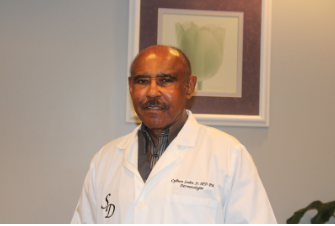Day in the Life of a Dermatologist
Career Column: Dermatologist
October 25, 2022
Many students come into high school with a sense of humility, ready to take head-on the trials and tribulations high school brings. Career choices are a vital step and area to think about as students are on the brink of something known as adulthood. Some may know what they want to pursue, but others are not too sure. Dermatology is a medical specialty with vast ins and outs. Dr. Clyburn E. Soden is the owner of Soden Dermatology in Laurel, Maryland. He started his practice at Soden Dermatology and the progression leading up to who he is today is fascinating.
Dr. Soden went to Frederick Douglas Highschool, where he took important classes for his development in the future such as chemistry, physics, and biology. Along with science classes, Dr. Soden believes that you can both enjoy and excel in your high school experience if you “balance the things you like” and be broad in activities you do, but also do it with “moderation.” He did wrestling, tennis, and cross-country.
He then went on to Morgan State University’s Pre-Med program. Dr. Soden said that the steps in becoming a doctor would be “college, medical school, residency, then practice.”
Some students are uncertain of their pathway to the right career for them and get discouraged when their peers have solidified plans, while their own plans seem scattered. Doctor Soden didn’t know right away that he wanted to be a dermatologist. He initially selected pediatrics, as he loved children, but things don’t always go as planned. He said, “I was fortunate because the military paid for a good part of my medical career.”
Now as a full-time certified dermatologist, Dr. Soden’s days usually start at 7:30 a.m., seeing patients through new visits, follow-up visits, and surgical procedures. Some surgical procedures that he performs include skin cancers, cysts, benign tumors, and moles. There are also cosmetic procedures that he does, like botox, skin fillers, and hair treatments. He said that to care for patients properly you must have “communication skills” to make them comfortable.




Cylburn Soden • Dec 20, 2022 at 11:53 am
Good Morning Gabriella,
Thank you for the interview. I hope that my experience will create an interest in going into medicine.
Best Regards,
Dr. Soden Sr.